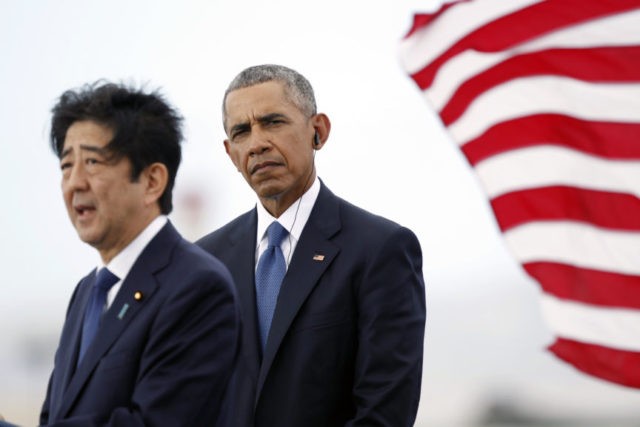Japanese Prime Minister Shinzo Abe offered “sincere and everlasting condolences” during his visit to Pearl Harbor, but did not apologize for the surprise attack that was unforgettably denounced by President Franklin D. Roosevelt as “a date which will live in infamy.”
“As the Prime Minister of Japan, I offer my sincere and everlasting condolences to the souls of those who lost their lives here, as well as to the spirits of all the brave men and women whose lives were taken by a war that commenced in this very place. We must never repeat the horrors of war again,” said Abe, in the passage of his remarks that will surely be the most widely quoted and discussed.
Speaking after his visit to the USS Arizona memorial, Abe said it was “a place which brought utter stillness to me.”
He did not understate the enormity of the attack on Pearl Harbor, or the horror of the lives that were lost, during his often poetic speech.
“Inscribed there are the names of the servicemen who lost their lives,” the Prime Minister said. “Sailors and marines hailing from California and New York, Michigan and Texas, and various other places, serving to uphold their noble duty of protecting the homeland they loved, lost their lives amidst searing flames that day, when aerial bombing tore the USS Arizona in two.”
After envisioning the scene aboard the ships at Pearl Harbor on the morning of December 7, 1941, Abe said, “Each and every one of those servicemen had a mother and a father anxious about his safety. Many had wives and girlfriends they loved. And many must have had children they would have loved to watch grow up. All of that was brought to an end. When I contemplate that solemn reality, I am rendered entirely speechless.”
He said the Japanese people have taken a “solemn vow” to never wage war again, a vow he repeated to “the souls of the servicemen who lie in eternal rest aboard the USS Arizona.”
Abe praised Japan’s creation of a “free and democratic country that values the rule of law,”and said his people harbor “quiet pride in the path we have walked as a peace-loving nation over these 70 years since the war ended.”
Abe spoke of visiting the memorial marker for an Imperial Japanese fighter pilot named Commander Fusata Iida who died after refusing to return to his carrier during the Pearl Harbor attack, and noted it was U.S. servicemen who built the marker in tribute to Iida’s bravery.
(The U.S. Marine Corps regards Iida, the highest-ranking officer in the attack force, as World War II’s first kamikaze pilot; he was shot down before he could hit either of the targets he was likely aiming at.)
Abe said the respect shown to Iida, and the compassion shown to the Japanese people after the war, were examples of “the spirit of tolerance embraced by the American people.”
“The goodwill and assistance you extended to us Japanese, the enemy you had fought so fiercely, together with the tremendous spirit of tolerance were etched deeply into the hearts and minds of our grandfathers and mothers. We also remember them. Our children and grandchildren will also continue to pass these memories down and never forget what you did for us,” he said.
Abe said the world urgently needs the “spirit of tolerance and the power of reconciliation” exemplified by America’s relationship with Japan.
“Japan and the United States, which have eradicated hatred and cultivated friendship and trust on the basis of common values, are now, and especially now, taking responsibility for appealing to the world about the importance of tolerance and the power of reconciliation. That is precisely why the Japan-U.S. alliance is ‘an alliance of hope,’” he said.
Abe and Obama “placed a pair of green-and-peach wreaths made of lilies aboard the USS Arizona Memorial and tossed purple flower petals into the water,” as the Associated Press reported.
The AP cites Japan’s government describing Abe’s visit as “powerful proof that the former enemies have transcended the recriminatory impulses that weighed down relations after the war.” It is also portrayed as “an act of symbolic reciprocity, coming six months after Obama became the first sitting U.S. president to visit Hiroshima in Japan, where the U.S. dropped an atomic bomb in hopes of ending the war it entered after Pearl Harbor.”
As the Associated Press report observes, Japanese feelings on the war remain conflicted. Abe’s visit to Pearl Harbor is seen as politically sensitive today, and would have been impossible just a few years ago. Remarkably, the Japanese government claimed last month that Pearl Harbor wasn’t supposed to be a surprise attack, and America’s formal invitation to join the war merely got lost in a bureaucratic shuffle.
Prime Minister Abe had domestic political considerations, and delicate relations with other nations along the Pacific Rim, to consider when he chose his words. The Chinese Foreign Ministry was sneering that Japan “can never turn this page over without reconciliation from China and other victimized countries in Asia,” even as Abe was landing in Hawaii.
Even so, it might have been better for Japan’s national psyche if Prime Minister Abe had taken responsibility and offered a forthright apology at Pearl Harbor, instead of talking about a worldwide tragedy that “commenced” there. It didn’t commence on its own. Somebody commenced it, and it wasn’t the American servicemen Abe described so beautifully.
Prime Minister Abe’s speech begins about 25 minutes into the White House video embedded below:

COMMENTS
Please let us know if you're having issues with commenting.